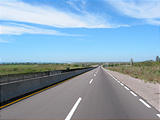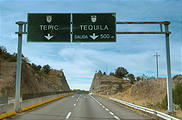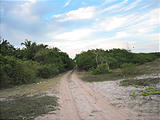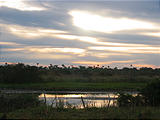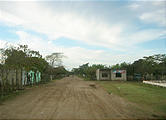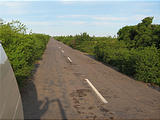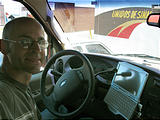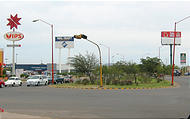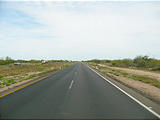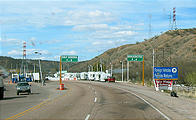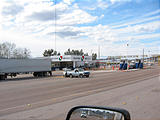Going Home
When I finally started having the urge to be home again, I left and started driving north along the Gulf of California (Sea of Cortez). Except for a few stretches between Guadalajara and Mazatlán, there are high-speed toll roads available. If the trip from Morelia to Seattle, WA were to be done without stopping except for gas and sleep, it would take 5 days of solid driving (8 to 12 hours/day), with 3 of these days spent in Mexico and then 2 days in the US.
These toll roads are the only way to go if you want to make time. I ended up paying US$180 in tolls to drive about 1500 miles from Mazatlán to Morelia and then later back to the US border at Nogales. They took my money a little bit at a time — I ended my trip with 35 individual tollbooth receipts stuffed in my glove compartment. These toll roads are limited access, but there are no fences. The locals know all the secret dirt tracks for getting on an off in order to bypass the toll booths.
Mountainous toll roads have frequent distinctive black and white roadside "wells" supplying "non-potable" murky green water (for filling radiators I assume). Some steep downhill highway stretches have a special red stripe along the center with sensors for runaway trucks. Apparently if your truck loses its brakes, you can drive on this lane, and activate the sensors to sound an alarm — not that I'm entirely sure what good that does.
The toll roads unfortunately stop at either side of most major cities, dumping you onto the local streets. Getting through Guadalajara requires almost an hour of busy intersections, traffic lights, and people selling you things or trying to wash your windshield.
Much of the drive along the coast south of Mazatlán still has no toll roads. The local roads you must use instead are two lanes, narrow and bumpy, stopping at each little town. They are a very exciting drive sometimes, as the bus drivers all like to amuse themselves by passing whenever possible. Despite the "Max. 95 km/hr" signs painted on them, they drive much faster, and have evidently learned exactly how much time they need to get out into the other lane, and then back in just before the oncoming traffic arrives. Perhaps they also have the ability to see around corners.
tuxpan
Between Tepic and Mazatlán, I decided to try to find a beach to camp on for the night. Studying the map, I thought I might be able to make a loop, heading west to the beach from the town of Tuxpan, then north up the beach from Santa Cruz to Playa Novillero, and then back east to the highway via Tecuala.I followed the narrow paved road west from Tuxpan over 30 miles of
marshlands, through a couple tiny towns where everyone stared at me like they've never
seen a tourist before (perhaps they hadn't), and then north on a dirt track
paralleling the coast for another 15 miles, as the road got fainter and fainter — finally petering out onto a sandy beach.
It turned out that I hadn't noticed a tiny waterway on my map, an impassable gap in my planned loop route — the Canal de Cuautla (Cuautla Channel).
I read later
that the Canal de Cuautla was a 1971 attempt to increase fish production by connecting an inland lagoon to the ocean, but severe erosion has caused it to widen significantly since then. 
 22.1691, -105.6464
22.1691, -105.6464
In any case, the sun had set, so I set up camp on this beach. I was joined by wandering cows, and soon discovered that the place was infested with hoards tiny biting gnats (jejenes )! Their bites were at first sharply painful, and then... itchy!!! These pesky insects were so tiny they could fly right through my camper van's screens! I had to spend the humid night hermetically sealed — with all the windows closed. Now I see why this beach isn't a built up tourist destination!
In Mazatlán, I stopped for supplies and internet. The big modern supermarket I visited was no different from Wal-Marts and K-Marts everywhere, except in Mazatlán there is a scary black "vigilante" parking lot security guard tower watching over things. And old guys blowing whistles to "help" you (for tips) back out of your parking space.
Cruising the streets of Mazatlán for wireless internet access was successful, but I had to be careful about stopping near traffic lights, as gangs of kids would come running up and try to wash my windshield. Waving "no" and running the windshield wipers doesn't make them stop squirting water and wiping their dirty rags. Revving the engine and lurching forward a bit works better.
I passed through Navojoa, the source of Tecate beer.
A few miles south of the US border at Nogales, I turned in my Temporary Vehicle Importation Permit at Mexican customs. Then I followed the highway bypass that took me all the way to the border. This bypass cuts through the outskirts of Nogales, but allows no access to the city. The road has frequent security cameras and serious fences on either side (but nonetheless I did see a few people climbing through holes under these fences, and running across the highway to the other side).
When I crossed the border into the US, I was already nostalgic for driving in Mexico. In the US, driving was just too easy — no thinking required. And people set their cruise controls for 9 MPH over the speed limit and park themselves in the left lane of the highway. In Mexico I never had to pass anyone on the right (except for one huge RV with Montana plates).
But I didn't really miss:
- elevated roads with no shoulders or guardrails
- bump, bump, rattle, shake
- always being on the lookout for killer potholes
- trash strewn about
But despite my whining, it was a wonderful trip. As I sit here in Seattle, I'm already dreaming of going back again someday, perhaps eventually for a road trip all the way to Costa Rica .


